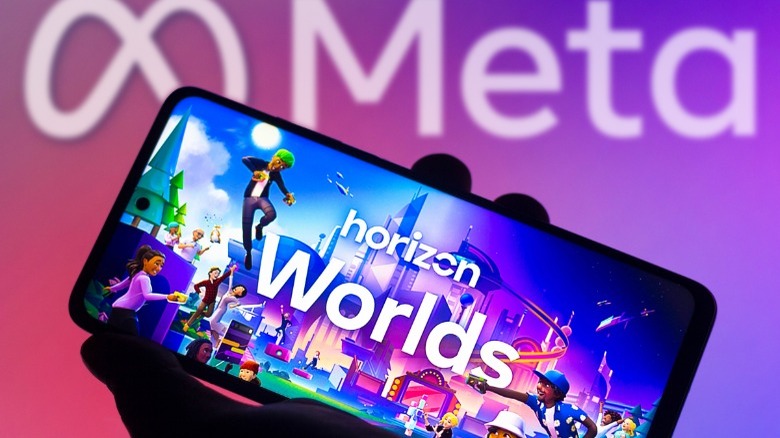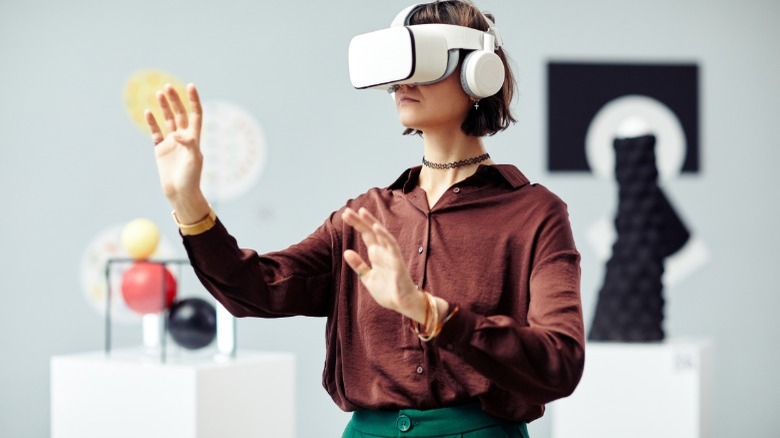What The Metaverse Could Do To Humans
Imagine you're playing The Sims, but instead of a character, the person you're manipulating is yourself. Imagine the other Sims you interact with are also real people, and the things you all do in the game could have real-world consequences. Now, you're getting close to imagining the Metaverse.
CNN Business explains that ideally, the Metaverse is a virtual world that helps people feel more connected to others online, but it could also make the internet more omnipresent in our lives than it already is. It relies on augmented reality and virtual reality (VR) technology to make people feel as if they're actually inside the internet. It may be used in both work and social life as well as entertainment spaces. For example, Microsoft is developing Metaverse technology to be used in tandem with its Teams platform, so that instead of having the option of video or no video in virtual meetings, workers could use personal avatars that move and talk as they do. The program, called Mesh, will also allow workplaces to create virtual spaces in which workers' avatars can meet and mingle, theoretically replicating an in-office experience for remote workers.
Microsoft and Facebook launched early versions of their Metaverse technology in 2022. Roblox Nvidia is also developing its own (via Vox). However, as this technology takes its first steps, many are already concerned about the negative effects it may have on people, particularly on body image.
Avatars and body image
When Mark Zuckerberg presented his Metaverse concept in 2021, he also renamed his company Meta. CNN Business suggests this rebranding was an attempt at leaving behind Facebook's recent controversies, including concerns about political messaging on its social media platforms and research showing Instagram negatively affects young women's body image. The latter problem may continue in the Metaverse, however. Meta's Codec Avatars program is working to make Metaverse avatars more customizable and realistic. MIT Technology Review explains this may help people feel more represented than they did by previous avatar systems, but it may also allow people to create "idealized" versions of themselves, essentially giving themselves fillers, whitewashed features, and other body modifications that could damage their real-life self-image.
A small study conducted in 2021 by Colorado State University and Seoul National University showed this type of effect on women with preexisting body image concerns; when they were tasked with creating realistic avatars of themselves — without modifications — they felt worse about their bodies than before (via MIT Technology Review).
Personas and prejudice
Controversy on the Second Life multimedia platform shows that real-world discrimination can follow us into virtual spaces. Second Life, often called the "first Metaverse" allows users' avatars to interact with each other in a virtual reality. In 2017, an in-game fashion brand began to share anti-fat rhetoric in their virtual stores and via messaging. They received backlash from other users. Second Life user Wagner James Au says early Second Life avatars weren't realistic — you could even play as an animal or a fairy — but as they've become more human and lifelike, real-world prejudice has crept into the game. Users with unusual-looking avatars are more likely to face discrimination, he told CNN Style. There's fear that racism may creep into these spaces, too, and the lack of accountability in a virtual space may make it worse.
Au also said he thinks most people in virtual reality spaces want their avatar to be "an idealized version of what they look like, or a completely different persona." New York Times writer Kashmir Hill partially confirmed this when she played "Horizon Worlds," Meta's (formerly Facebook) VR-based social network. She described meeting people whose facial features or even race were different in the game than in real life. She also noted that "many people choose to look as they do in real life, but pseudonymity is still part of the appeal."
Will the metaverse catch on?
If there's a silver lining here, it may be that the Metaverse isn't particularly popular yet. As of October 2022, Horizon Worlds only had around 200,000 monthly users, compared to 3.7 million across Meta's other platforms (Facebook, Instagram, etc.). Zuckerberg has essentially bet the future of his company on this project, but the company's profits and worth dropped considerably in 2022. They lost around $9.4 billion on Metaverse projects in the first nine months of 2022 and expect bigger losses in 2023, according to CNN Business.
CNN Business says it's unclear whether anyone really wants to use the Metaverse. VR headsets can still be prohibitively expensive, for one thing, and they aren't comfortable. David Lindlbauer leads the Augmented Perception Lab at Carnegie Mellon University but says he still hasn't found a headset he'd want to wear all day. Kashmir Hill agreed, noting her headset's size and weight made it uncomfortable, although she enjoyed Horizon Worlds enough that she plans to keep playing (via The New York Times). A Vox writer noted that he saw more drawbacks with the Metaverse the longer he spent in it, and nausea caused by the headset was one of those problems.
Way back in 2014, it was Google trying to make VR and augmented reality mainstream. They failed because of consumers' privacy concerns. Meta may very well hit the same wall (via Vox).



